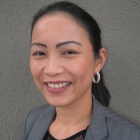(L-R) Roseli Ilano, Aimee Suzara, David S. Maduli, Joan Iva Cube, Edene Matutina, Kristen Sajonas, Thomas Paras, and Aimee Espiritu.
“Walang hiya” is one of the worst insults thrown in the Tagalog language. The phrase means “(You have) No shame,” and behind this insult resides a cultural dictate to respect those in positions of authority or higher social standing. This dictate was overturned at the book launch for Walang Hiya … Literature Taking Risks Toward Liberatory Practice which took place earlier this month at the Bayanihan Community Center in San Francisco. Artwork and readings demonstrated that resistance to unfair dominant control and representation leads to empowerment. Editor Roseli Ilano and president of Philippine American Writers & Artists, Inc. (PAWA) Edwin A. Lozada hosted the event.
Walang Hiya adds to the number of Filipino American anthologies that have proliferated in the last decade, including Babaylan, Pinoy Poetics, and Field of Mirrors. The success of these anthologies attests to the enormous efforts made by Filipino American writers in establishing an identity and community. These great strides mark an improvement from only ten years ago when literary critic Oscar V. Capomanes proclaimed “the incommensurable sense of nonbeing that stalks many Filipinos in the United States,” referring in part to the invisibility of Filipino Americans in American history and discussions of Asian American literature.
What distinguishes Walang Hiya from other anthologies is that it was conceived specifically as a tool for educators and community activists. Editors Lolan Buhain Sevilla and Roseli Ilano, who met while organizing in the East Bay Filipino Community, devised a series of critical questions and exercises for each of the book’s four sections. “Human rights, social justice, and education are very important to Lolan and I,” Ilano explained. “Through the anthology, we strove to find a way to use art and literature to not only bring people together, but as a way to use the narrative form as a departure point for personal and political transformation. Stories are powerful. Being able to share our stories in creative ways is a critical component of any kind of positive change.”
The launch showcased a diverse range of styles and voices. What ultimately unites the readings and artwork is their sheer energy – their willingness to push boundaries, to question assumptions, and to confront limitations that have defined Filipino Americans for too long. In doing so, the artists collectively transformed experiences of marginalization, hurt, and outrage, to one of celebration.
Highlights included spoken word performances by David S. Maduli and Aimee Suzara. Maduli presented “Old Man,” about a grandfather who struggles with nightmares of the Japanese occupation of the Philippines even as his memory deteriorates. Maduli’s delivery was sharp, each syllable like the snap of gunfire, enacting the physical, psychological, and emotional violence at the heart of his poem. Equally impressive was Suzara’s “Because Going Back Home is Not Always Romantic,” about the paradox in the ability of cultural redactions to insult and yet also to seduce. Suzara’s background as both an award-winning performer and playwright shone through her unique style, one of impassioned outspokenness that managed to avoid lapsing into facile melodrama too often found in spoken word.
Also distinct among the readings were the meditational poems “Prayer” by Edene Matutina which explored religious taboos against sexuality, and “Functional Paper Cranes” by Thomas Paras, a lament against the limitations of language.
While the readings illuminated different aspects of Filipino American history and experience, one strong theme that surfaced was the problem of cultural amnesia. Joan Iva Cube’s chapter “Penance” from her novel-in-progress offers a reason: “It was easier… to forget rather than try to balance that tightrope between two different worlds.” Her teenage character’s painful difficulty with trying to understand religious observations during a visit to the Philippines speaks to the intergenerational conflict and resulting forgetfulness that often plague immigrant families.
Perhaps most worthwhile to note is that all the anthology contributors also work as educators, community activists, and volunteers, further proving that these artists truly walk their talk. Kristen Sajonas who opened the launch with a tearful reading of her poem “They are Even Afraid of Our Songs of Love…,” a lyric tribute to the power of romantic love to inspire political courage, explains her belief in art as a vehicle for social change: “The idea that art is simply “entertainment” or “distraction” numbs critical thinking and tries to pass off as truth the myth that we can unplug and depoliticize ourselves at any time and place of our choosing just because we want to, a notion that smacks of privilege and is political in itself.”
In addition to the performances, the audience admired collage artwork by Aimee Espiritu who designed the book’s section breaks. Her collages bring together discordant images and force the viewer to thread the significance between them. One collage in particular superimposed photos of a jeepney, the Banawe rice terraces, a crucifixion, a barefoot hiker, and two women in traditional costume, among others, upon a layout of U.S. naturalization questionnaires, likely in an effort to contemplate the complexity and expansiveness of the Philippine diaspora.
Walang Hiya’s uncompromising stance has led to its success. The launch closed with the exciting announcement that the anthology will be included in readings lists for Philippine literature courses at San Francisco State University.
For more information, visit www.walanghiyaanthology.com.










Comments